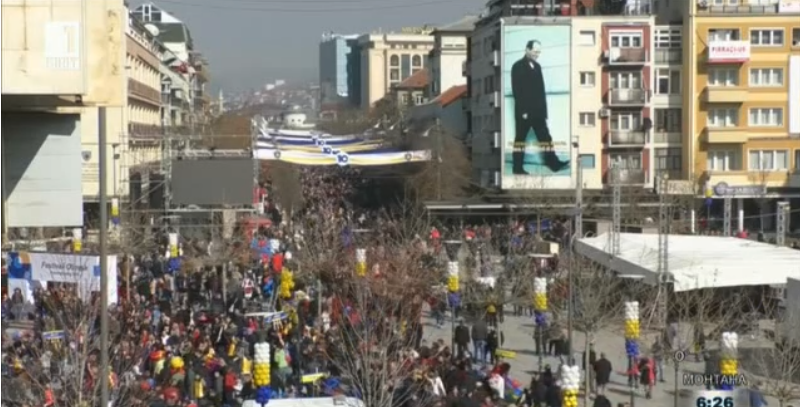The focus is on the Western Balkans with the beginning of the Bulgarian Presidency, the European integration is a top priority of the Bulgarian Presidency, and for the first time the European Commission presented a strategy for the region.
But what are the points of view of ordinary Europeans, the Members of the European Parliament who represent them, is there also a unity among the member states of the European Union are the main topics from a documentary which is part of “The Bulgarian Travel across Europe” project.
There is a well-known joke on the Balkans - when it comes to European integration - people are divided into pessimists and optimists. Optimists believe that Kosovo will join the EU during the Serbian presidency, while pessimists believe that Serbia will join the EU during Kosovo’s presidency.
Ignored for years by the West, the countries of the region have become more attractive to other geopolitical powers, and the European Union's unwillingness to make commitments to the six states has led to people losing hope. Now, however, the situation is different. On February 6, the European Commission adopted a strategy for the Western Balkans, which aims to give new impetus to European integration and give rise to more purposeful reforms in the countries.
Gradual increase of pre-accession EU funds, infrastructure projects, rule of law and anti-corruption, digital connectivity - these are part of the 6 initiatives outlined in the document of the European Commission. All diplomatic means have been mobilized for this purpose, and Bulgarian Commissioner Mariya Gabriel has identified the Balkans as a personal priority.
Mariya Gabriel, European Commissioner for Digital Economy and Society: I believe that this part of Europe is part of Europe. That is why I believe that thanks to digitization, we can offer specific dimensions to the European perspective of the region. My idea is to present a roadmap for reducing roaming charges. Digitization is another chance - we know how important it is to give young people a perspective. Young people need jobs, from the perspective of development, start-ups, innovation, entrepreneurs, she said.
The strategy focuses on resolving bilateral disputes before eventual membership, and as a foreseeable date for this is 2025. The European Commission describes the document as extremely comprehensive, but the member states remain divided. Hungary has come to the fore and has clearly expressed dissatisfaction with that date, being too remote, especially for countries such as Serbia and Montenegro, which are already in a process of negotiations.
Peter Sijard, Minister of Foreign Affairs of Hungary: I am very disappointed with the strategy because I think integration and the integration process must be much faster. The Western Balkans face tremendous challenges from the emergence of tension, and this tension may be most easily settled if the integration process develops swiftly, he said.
In the current term of office, the European Commission does not envisage the accession of a new member state, and the very process of increasing the number of members of the European family is a complex procedure that requires firm support from the three European institutions. In the European Parliament, the opinions of directing the attention of the Western Balkans at this very moment are divergent.
Manfred Weber, President of the EPP: The Western Balkans are Europe. There is no doubt about that. They have a European perspective. What we need to do now is to achieve specific results in this region. For too many years in this region, no positive development has been achieved, so we have to devote ourselves to specific issues such as infrastructure development, building rail links, motorway construction, to improve infrastructure to contribute to economic development.
Peter Lundgren, a member of the EP's "Europe of Freedom and Direct Democracy" Group: Enlargement at the moment is not even possible. This is also one of the strange things in the European Parliament. We see the effects of Brexit - a huge loss of revenue for the European Union, but no one in a leading position in this building says we have to cut back because we will not get money from the UK, no one says it. All the time they are trying to figure out how to replace that money from other sources.
And the opinion of the MEPs coincides with the opinion of the young Europeans. For Peter and Istvan - students from Budapest - the Balkans are part of Europe, but the bloc has to solve far more pressing problems.
Peter Martin, PhD in Political Science at Central European University in Budapest: If you look from a historical point of view, the EU has always been in a period of stagnation or crisis, but has always sought enlargement, and then has given time to search for new solutions . At the moment, given the statements of the European Commission, I do not think enlargement is on the agenda. I have no personal preferences to whether one or other Western Balkan country should join. There are still many unresolved disputes there - some are small, others big. I do not think that such an enlaregement now solve the many problems - reforming the migration system, deciding what to do with the Schengen area. I think we need to focus more on solving current problems before we expand.
Istvan Posfai, Master of Public Policy at the Central European Univerity: In the long run, I would be happy to see the Western Balkans in the EU. I agree that now is not the right moment, creating more problems will not be very wise. If it were decided that the Western Balkans might be integrated into the EU, this should be done wiser than in 2004 and 2007, because then there was no back-up plan, he added.
BNT: Focus on Enlargement and European integration during Brexit. Is it now time to draw attention to the accession of new member states?
Johannes Hahn, European Commissioner for Enlargement and Neighbourhood Policy: In fact, the two processes do not contradict each other. One, unfortunately, is the necessary negotiations for the leaving of the United Kingdom, but on the other hand we have the Western Balkan countries and their perspective. For us, the Europeans, it is clear - we either export stability or bring instability.
What remains is to have continuity between the current and the next European Commission. The plans are the successor of Jean-Claude Juncker, who will take office in 2019 to set up a separate directorate to deal with countries that have real chances of membership.









 Чуй новините
Чуй новините Подкаст
Подкаст



















